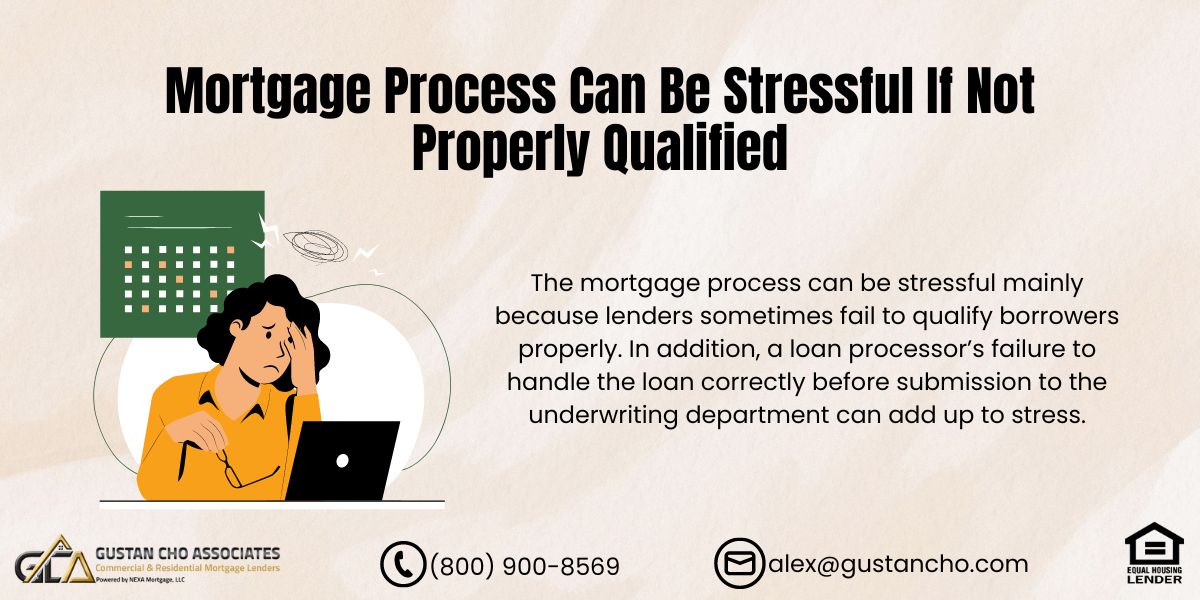This Article Is About How The Mortgage Process Can Be Stressful If Borrowers Not Properly Qualified
The mortgage process does not have to be stressful. The number one reason why the mortgage process can be stressful is that the loan officer did not properly qualify borrowers. Another reason why the mortgage process can be stressful is that mortgage processors did not process the loan correctly prior to submitting it to the underwriting department. There are many considerations by homebuyers during the home buying and mortgage process.
Mortgage Process Can Be Stressful: Issuance Of Pre-Approval
All Mortgage Pre-Approvals should never be issued by loan officers unless the borrowers are properly qualified. Loan Officers should issue pre-approval letters if and only if the borrower has been properly qualified. With pre-qualification letters, homebuyers can shop for homes. Buyers should never enter into a real estate purchase contract with a pre-qualification letter.
All pre-approvals issued at Gustan Cho Associates Mortgage Group are full loan commitments that have been fully vetted, a tri-merger credit report has been run, and the borrower got an approve/eligible per automated underwriting system.
All pre-approvals should be underwritten and signed off by mortgage underwriters if the loan officer has any doubts about the borrower’s qualifications. This holds especially true on all manual underwriting files. Home Buyers should only enter into a real estate purchase contract with a solid pre-approval letter by the loan officer and/or a mortgage underwriter.
The number one reason why the mortgage process is stressful is that home buyers enter into a real estate contract with a pre-approval letter being issued but not fully vetted and/or qualified. Manual underwriting files with late payments after bankruptcy and/or foreclosure should be underwritten and signed off by a mortgage underwriter. This is another main reason for the last-minute loan denial. Gustan Cho Associates closes 100% of all our pre-approval since they have all been vetted and qualified prior to the issuance. Click here to start your mortgage process now
Mortgage Process Can Be Stressful in 2024
The tension accompanying the mortgage acquisition process in 2024 will differ due to various considerations such as market situation, personal finances and lending itself. The following are some of them:
Market Conditions
Interest Rates: Higher interest rates could mean that borrowers looking for affordable monthly payments find it harder to get cheap mortgages.
Housing Market: In a market where demand is high and supply is low, finding a house and putting it under contract can be stressful. There are also bidding wars and fast rising prices.
Lending Environment
Regulations: Changes in mortgage lending regulations can affect the ease or difficulty of obtaining a home loan. This means that getting a mortgage may become more challenging for some borrowers if there are more stringent requirements.
Lender Requirements: Different lenders have diverse stipulations which might impact on how stressful an application process may turn out to be. Non-QM loans, for example, might impose steeper down payment requirements or charge higher interest but provide greater flexibility.
Individual Financial Situation
Credit Score: The mortgage process can be complicated if individuals with poor credit scores face rejection or higher costs.
Debt-to-Income Ratio: Having a lot of financial obligations compared to income makes qualifying for mortgage difficult thus adding stress to the process.
Employment Stability: The stability of one’s job as well as income certification can influence approval stages of mortgages. Self-employment or variable incomes can create additional challenges during this period especially for those who work alone/self employed persons.
Types of Mortgages
Traditional Mortgages: Conventional loans, FHA, VA, and USDA loans have different requirements and stress points. While FHA and VA loans may have lenient credit demands than traditional ones still they entail other conditions.
Non-QM Loans: Those people who do not match usual lending standards can go for non-QM (Non-Qualified Mortgage) loans but these come with some negative stressors and increased interest rates.
External Factors
Economic Conditions: Inflation, employment levels, economic insecurity and other socio-economic factors of the overall environment may affect how much stress is related to getting a mortgage.
Support and Resources
Professional Guidance: Seeking support through experienced mortgage loan officers as well as financial advisors may help reduce tension by offering direction and encouragement throughout this period.
Technology: In particular, the use of technology in some sections of the mortgage process has made it more transparent and efficient in terms of time, thus reducing associated pressure points.
In conclusion, individual experiences may vary due to different circumstances among other things. Preparing adequately for such eventualities, familiarizing oneself with all aspects involved and seeking advice from professionals can help individuals manage their stress levels when applying for a mortgage.
Click here to qualify for FHA, VA, USDA Loans
What Factors Affect a Borrower’s Ability to Qualify for a Mortgage?
This process can be demanding especially in 2024 when many things may determine whether or not an individual qualifies for a mortgage. For these reasons, one should have more than enough information in order to get ready as well as increase the chances of getting a house loan.
Credit Score
Importance: High credit rating means that the borrower is responsible with financial matters and lowers perceived risks for lenders.
Impact: Usually, borrowers with higher scores will enjoy better rates on their loans and even terms. On the other hand, lower scores could result in higher interest rates or denial of the mortgage application and this makes it even more stressing.
Debt-to-Income Ratio (DTI)
Definition: DTI ratio represents what fraction of a borrower’s overall income goes towards payment of debts per month.
Impact: This is because if an individual has manageable amount of debt, then this ratio would be low which lenders favor since usually it should range below 43%. However, certain lenders can allow more than 43% depending on some factors. The approval process is made hard by having a high DTI which adds to stress levels.
Employment and Income Stability
Importance: It is essential for lenders to have confidence that their borrowers have the means to meet their monthly mortgage obligations, so having reliable income sources is crucial.
Documentation: In most cases documentations such as pay stubs, employment verification records, tax returns among others are required by banks from people who are employed consistently and earning regularly. Additionally, business returns for self-employed persons plus profit loss statements might also need to be provided before getting approved for a home loan from banks that require such documentation which makes taking the mortgage stressful enough.
Down Payment
Amount: Approval and terms change due to size of down payment since larger ones reduce loan-to-value (LTV) ratio thus preferred by lenders.
Programs: Some loans like FHA or VA have lowered down payment requirements which enable many people to access them. Saving for a down payment is stressful to a lot of individuals.
Savings and Assets
Reserves: Often, lenders require borrowers to have reserves so that they can be able to make their mortgage payments during unexpected financial difficulties.
Verification: Reserves are proven using bank statements as well as other asset documents such as investment accounts. Ensuring there are enough savings may lead to stress in the process of securing a mortgage loan.
Property Type and Value
Impact: The property type and value being bought can impact on loan qualification. The LTV ratio mainly determines if the property meets lender’s criteria through assessing its value.
Types: Some property types like single-family homes, multi-family homes, condos, or co-ops might come with different requirements for borrowing purposes. Finding an ideal house is one of the most stressful moments in that whole deal.
Loan Type
Options: Different types of loans consist of conventional ones, FHA loans, VA loans, USDA loans and non-qualified mortgages which have certain qualification standards.
Specifics: A few aspects which differ among various loan classes include credit scores required by each one, down payments necessary and DTI ratios set per type. Knowing what each entails can enable one decide on which loan product will suit him best thereby adding complexity and stress because several choices exist at once.
Economic Conditions
Influence: General economic conditions especially interest rates inflation rate as well as employment level have an effect on whether or not someone qualifies for a mortgage.
Lender Policies: Therefore these situations may be instrumental in shaping up some policies thus influence availability of mortgage products hence making it difficult for those who would wish to borrow from firms offering home loans since lending industries have varied rules which at times become complex when shopping for that facility.
Lender Requirements
Variations: Different lenders typically have dissimilar requirements or criteria when it comes to approval of mortgages.
Shopping: Borrowers may gain by shopping around and comparing quotes from various lenders to get best terms and conditions. The need for comparisons and negotiations can be stressful.
Documentation and Preparation
Completeness: Submitting complete and accurate documentation is very important for a hassle-free mortgage application process.
Preparation: Having all necessary documents, knowing the procedures involved, working with professionals who know what they are doing will increase the chances of getting a mortgage approved. But, gathering all essential papers required for the mortgage process can also increase stress levels.
Requirements by each lender may differ depending on their preferences as well as having proper documentation, which is necessary during lending processes, makes the mortgage process stressful. Getting ready for such aspects will enable borrowers to handle mortgages better, reducing the stresses that come with it.
Considerations Prior To Buying A Home
There are many things to consider when buying a home:
- Moving to a new neighborhood where do not know anyone can bring on a lot of stress
- So can getting to know the area and settling children to new schools
- However, the most stressful process in the home purchase process is the mortgage process
- Many folks are all upbeat when they first consult with their loan officer and get qualified
- By the time closing time rolls around, their loan officer is probably their least favorite person
In this article, we will discuss and cover how the mortgage process can be stressful if borrowers are not properly qualified. Buy a Home without stress, Click here to contact us
Top Reasons Why Mortgage Process Can Be Stressful
Many tasks requested by loan officers might not make a lot of sense to home buyers. Borrowers provide 2 months bank statements. All of a sudden borrowers will be asked to go to the bank and get two months worth of printouts of bank statements. Not just getting 60 days of printouts but to get it signed by the teller and have the teller date it and stamp it. Why the task of supplying bank statements twice?
In cases like these, loan officer probably may have noticed overdrafts on bank accounts. Even though borrowers provided two months bank statements, there is a line item on every bank statement where it shows YTD overdraft fees. To avoid more explanations on overdrafts in prior months, loan officer probably will advise borrowers to just get bank printouts. Might not make sense, but many things in the mortgage world do not make sense.
Avoiding Mortgage Process Can Be Stressful: Bank Overdrafts In The Past 12 Months

Make sure the past sixty days of bank statements is clean, no overdrafts. Overdrafts are viewed by mortgage underwriters as being financially irresponsible. Some lenders do not accept bank overdrafts period. If you had bank overdrafts in the past 12 months, do not turn in your bank statements.
Bank overdraft fees will show up on the most recent bank statements. This is because there will be a column about YTD OVERDRAFTS FEES. If there is a number on this column, the mortgage underwriter will know there were bank overdrafts in the past 12 months.
If you had overdrafts in the past 12 months, go to the local branch of your bank and request 60 days of bank statement printouts. Have the teller sign, date, stamp, and sign the sixty days of bank statement printouts. Year-to-date overdrafts bank overdraft fees do not show up on the bank statement printout. A bank overdraft is not always a deal killer. If you cannot provide bank statement printouts and need to provide the actual bank statement, have your loan officer assist you with writing a letter of explanation (LOX) on the overdrafts. As mentioned earlier, some lenders are more strict with bank overdrafts than other lenders.
Irregular Deposits Over $200 On Bank statements
For borrowers with irregular deposits over $200 on your bank statements, the loan officer will probably ask to write a letter of explanation and source the deposits. For example, if there was a deposit on the bank account for $10,000, the loan officer will ask the source of deposit and documentation. If it was a gift from parents, the loan officer will ask for 30 days of bank statements from the parent’s account.
This way it will provide paper trail funds leaving parents account and going into borrowers. Copy of deposit slip and updated bank statements after gift funds is required by both parties.
Processing Mortgage
There may be a time where borrowers get conditional mortgage approval and submit all the required conditions but then the underwriter will come back with more conditions. This is when many get upset and start losing their patience. The loan officer might ask borrowers for updated paycheck stubs and updated bank statements. Borrowers submit updated paycheck stubs and bank statements and all of a sudden, the underwriter requests a letter of explanation why there was a $300 deposit and $1,000 withdrawal.
They also want proof or canceled checks. The mortgage process requires a lot of patience. Instead of arguing or trying to make sense, the best advice is just needed to submit whatever the underwriter requests. The loan officer should explain the reasoning behind why so many requests are being made. Consumers must realize that the mortgage business is one of the most regulated industries in the country.
What is Mortgage Stress Rate?
A mortgage stress rate is an interest rate that lenders use to determine whether a borrower will be able to make his or her monthly repayment in a scenario of higher interest rates. This is part of the mortgage stress test that ensures that homeowners can cope with their payments even if rates go up in future. Lenders check affordability of these payments at this high rate, rather than checking affordability at the offered rate.
Generally, this stress rate is set a few percentages above the current mortgage rates or some set benchmark value offering an extra layer of security for both ends of lending process.
Mortgage process can be stressful when stress rates are applied because they might affect the qualifying amount. Even if borrowers can afford payments at the current rate, they might qualify for a smaller loan amount when assessed at the stress rate. The approvals are only given to those that will not have difficulties with increased interest rates and hence helps ensure market stability. Although it contributes to making the mortgage process more complicated and stressful, its impact on both borrowers and lenders keeps them protected against possible financial troubles ahead thereby securing long term financial safety.
Are Mortgages Issued to Borrowers Who Are a Poor Credit Risk?
Even if a borrower is seen as high-risk by lenders, there are mortgages that can be extended to such persons but these loans have tough conditions and involve higher costs. There are alternative options like non-QM and government-backed loans, but the most recommended approach remains boosting one’s credit ratings. The mortgage process can be stressful particularly for individuals with bad credit scores; however, knowing available alternatives and managing risks could assist borrowers through this cumbersome task. Click here to qualify for mortgage loan with low credit scores
FAQs: Mortgage Process Can Be Stressful If Not Properly Qualified
-
1. What makes the mortgage process a stressful one? The mortgage process can be stressful mainly because lenders sometimes fail to qualify borrowers properly. In addition, a loan processor’s failure to handle the loan correctly before submission to the underwriting department can add up to stress. Another of these factors involves market conditions, personal financial status and the lending environment.
-
2. What is the stress rate on mortgages? Mortgage stress rate refers to interest rates that lending institutions use in order to test whether or not borrowers would afford their monthly payments even if interest rates rise in future. This rate is typically set several percentage points above current mortgage rates in order for borrowers’ ability to sustain possible increases in interest rates. The loans qualification process can be tension filled when applied with stress rates as they may affect amount lent making it hard for a borrower to receive their desired mortgage.
-
3. Can someone with bad credit get approved for a mortgage? Yes, people having poor credit scores can still be able to qualify for mortgages although terms are usually less favorable. They might face things like high rates of interest, bigger down payment demands and more stringent terms. Also an option for those who have bad credit includes government backed loans such as FHA and VA loans and Non-QM loans. However, this could make these clients stressed during the application since it may involve extra difficulties and costs.
-
4. What should prospective homebuyers look out for in a pre-approval letter? Homebuyers must make sure that their pre-approval letter is firm commitment where by; the lender has fully vetted and qualified them towards purchasing a house successfully. A thoroughly vetted pre-approval will entail obtaining tri merge credit report along with an approve/ eligible status from automated underwriting system (AUS). One should not get into real estate contract only using a pre-qualification letter. Having a strong pre-approval avoids last minute denials of the loan thus reducing headache associated with applying for home finance.
-
5. How do borrowers reduce stress during the mortgage process? Borrowers should get properly qualified by their loan officer before obtaining a pre-approval, furnish complete and accurate documentation promptly, take advice from experienced mortgage loan officers and financial advisors, understand loan requirements and prepare for potential challenges, and lastly shop around multiple lenders to compare offers so as to lessen or avoid these stressful moments.
Understanding all of these factors and being well prepared can help in mitigating stress associated with the mortgage process thereby increasing chances of securing a favorable rate.
If you have any questions about the mortgage process or you need to qualify for loans with a lender with no overlays, please contact us at 800-900-8569. Text us for a faster response. Or email us at alex@gustancho.com. The team at Gustan Cho Associates is available 7 days a week, on evenings, weekends, and holidays.
Related> Things That Will Halt The Mortgage Approval Process
This blog about Mortgage Process Can Be Stressful If Not Properly Qualified was updated on July 3rd, 2024.







